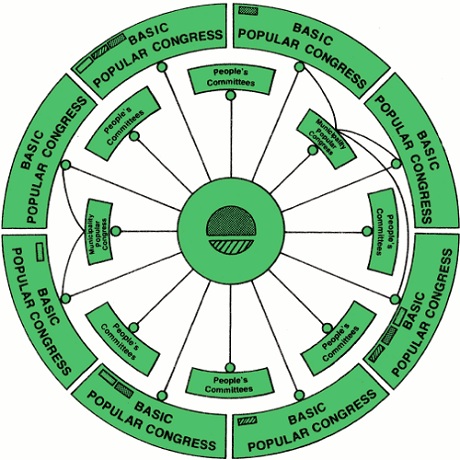More languages
More actions

The Third International Theory, also known as Third Universal Theory or simply the Third Theory, was the scientific socialist style of government proposed by Muammar Gaddafi in the early 1970s. The theory in practice took form in the Libyan Arab Jamahiriya, which reflected the direct-democratic, socialist and cultural values encased in the Green Book. Third International Theory was intended to usher in an "Era of the Masses," the successor to the "Era of the Republics" which would see the rise of direct-democratic principles as the solution to the contradictions surrounding the issue of governance. During the Libyan cultural revolution, the Higher Council for National Guidance was established to spread and aid the implementation process of Third Universal Theory while people's congresses were first being set up. It was proposed by Gaddafi as an alternative to capitalism and Marxism–Leninism for Third World countries, based on his stated belief that both of these ideologies had been proven invalid.
Characteristics
Direct democracy

Third Theory intensely critiques representative forms of governance on the basis that these structures not only isolate representatives from the masses but also limits expression in the parliamentary decision making process due to plebiscites and opportunistic party politics; therefore intensifying contradictions between the state and the masses. The solution to what was coined "the problem of democracy" is thus the establishment of a "state of the masses" or a direct democracy as it represents the fullest political expression of the masses. Gaddafi states that these democracies can only be constructed through voluntary people's congresses and committees comprised of all masses of society; which will then send delegations to the General People's Congress, which is considered a gathering of people's congresses rather than a parliament.[1]
Socialism
In the Green Book, Gaddafi argues that among the contradictions between owners and producers, workers and employers; is the issue of wage labor. He then argues that wage labor is slavery as it deprives workers to the rights to their production. The solution the to this is the establishment of an economy built by worker cooperation or "partnerships," in which producers reap the benefits of their production. Gaddafi goes on to state that the final stage of the socialist society is when profit and money will be rendered useless, thus disappearing and making communities fully productive and all material needs will be met.[1]
Cultural aspects
In accordance to direct democratic principles previously outlined the Green Book, Third Universal Theory declares that all laws must be natural, meaning that they reflect the cultural or religious values of society in order to justify them; as otherwise would result in contradictions between the power structure and the masses. Constitutions for example, are denounced as man-made laws that represent the will of the instrument of government and not the masses, as they exist to limit the mobility of the people within the political process.[1]
In practice
In the aftermath of the ratification of the Declaration of the Establishment of People's Authority after the end of the construction process of a Jamahiriya society during the cultural revolution, the Libyan state saw the establishment of people's congresses and committees across the country as the sole basis of the legislative and executive processes throughout the country.[2] People's congresses were guarded by local people's militia, which were planned to replace the armed forces in accordance to ideological principles that declared defense of society as the duty of the masses. Revolutionary committees were also established within all sectors of Libyan society to safeguard the Great September Revolution and agitate the masses to enhance popular participation.[3] Until the late 90s, private property was eliminated after businesses were seized by people's congresses and transformed into cooperative enterprises or absorbed by state owned conglomerates.[4]
